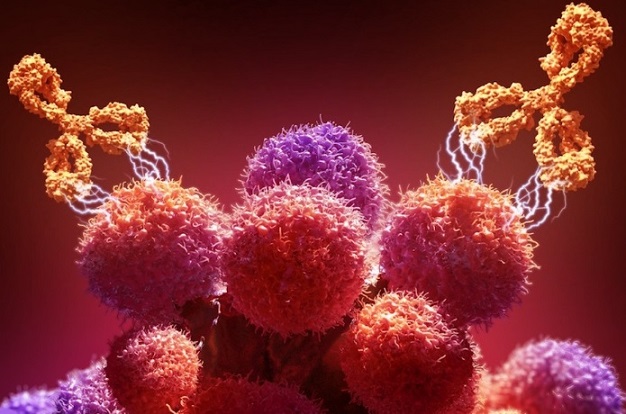BREAKING! New Antibody Breakthrough Offers Hope in Targeting Deadly KRAS Mutations Driving Cancer
Nikhil Prasad Fact checked by:Thailand Medical News Team Apr 18, 2025 1 day, 6 hours, 9 minutes ago
Medical News: In a remarkable leap forward for cancer research, scientists from Abbratech in Branford, Connecticut-USA, and Aviva Systems Biology in San Diego-USA have developed a new type of antibody that can precisely target a deadly cancer-causing mutation known as KRAS G12D. This
Medical News report covers the innovative approach that may eventually lead to better treatments for some of the world’s deadliest cancers.
 BREAKING! New Antibody Breakthrough Offers Hope in Targeting Deadly KRAS Mutations Driving Cancer
BREAKING! New Antibody Breakthrough Offers Hope in Targeting Deadly KRAS Mutations Driving Cancer
KRAS is a gene that plays a vital role in controlling cell growth. However, when it mutates—especially at a spot called G12—it becomes a driver of uncontrollable cell division and cancer. Mutations in KRAS are found in over 90% of pancreatic cancers, up to 40% of colon cancers, and 15% of lung cancers. One particular mutation, KRAS G12D, has proven to be especially aggressive and difficult to treat. For years, researchers believed that targeting KRAS with drugs was nearly impossible due to its structure and location deep within cells.
To overcome this challenge, the researchers employed a cutting-edge technique called “Epivolve,” which allowed them to create highly specialized antibodies that can recognize and bind specifically to the G12D version of KRAS. These antibodies are so precise that they can distinguish between the mutated KRAS and its normal, healthy version.
A New Type of Cancer-Fighting Antibody
Traditional antibodies often struggle to tell the difference between nearly identical proteins, such as a mutated KRAS and the normal one. However, using the Epivolve method, scientists began by modifying the target mutation to make it easier for the immune system to detect. Animals were then immunized with this altered version. Over time, their immune systems evolved antibodies capable of recognizing the actual KRAS G12D mutation.
Two powerful antibodies emerged from this process—IGT84 and IGT132. Both showed extremely high accuracy in recognizing KRAS G12D. In lab tests, the antibodies displayed more than 1,000 times greater binding to KRAS G12D than to normal KRAS proteins. This selectivity was confirmed using a range of methods including ELISA assays, Western blotting, surface plasmon resonance (SPR), and immunocytochemistry imaging on cancer cells.
In the Western blot experiments, the IGT84 antibody clearly detected the KRAS G12D protein, but not other similar mutations or the wild-type version. In tests on cancer cells from the pancreas and leukemia—both containing the KRAS G12D mutation—the antibody attached firmly to the mutated protein inside the cells. No such binding occurred in cells that did not carry the mutation.
Promise for Targeted Cancer Therapies
Another exciting feature of these antibodies is their strong binding power. The binding strength, measured using surface plasmon resonance, revealed a dissociation constant (Kd) of just 58 nanomolar—a figure that reflects ver
y high affinity.
Why is this important? Unlike small molecule drugs like Sotorasib (currently used for KRAS G12C mutations), therapeutic antibodies tend to last much longer in the bloodstream and can be engineered to carry drugs directly into cancer cells. The long half-life and targeted nature of these antibodies make them strong candidates for development into antibody-drug conjugates or other therapeutic approaches.
The study also highlighted the possibility of applying this antibody platform to other KRAS mutations and even to other diseases involving tiny but important genetic changes. The researchers believe this precision technology could revolutionize cancer diagnostics and treatment by allowing doctors to detect and destroy cancer cells carrying specific mutations without harming healthy cells.
Conclusion
This new study presents a promising future for personalized cancer treatment by introducing a way to generate site-specific antibodies that can differentiate between a single mutated amino acid and a healthy one. This level of precision could lead to safer, more effective therapies for patients with KRAS-driven cancers. The researchers are now working on improving these antibodies, making them suitable for human use, and testing their potential to actually treat tumors in clinical settings. If successful, these antibodies could serve not only as powerful diagnostic tools but also as new therapeutic weapons against previously “undruggable” cancers.
The study findings were published in the peer reviewed journal: New Biotechnology.
https://www.sciencedirect.com/science/article/pii/S187167842500041X
For the latest Cancer News, keep on logging to Thailand
Medical News.
Read Also:
https://www.thailandmedical.news/news/repurposed-hiv-drug-shows-promise-in-boosting-breast-cancer-chemotherapy
https://www.thailandmedical.news/news/south-korean-researchers-warn-that-tuberculosis-increases-risk-of-various-cancers
https://www.thailandmedical.news/news/breaking-study-shockingly-finds-that-a-form-of-vitamin-b3-supplements-actually-increases-cancer-prevalence-and-aids-in-breast-cancer-metastases
https://www.thailandmedical.news/articles/cancer
https://www.thailandmedical.news/pages/thailand_doctors_listings
